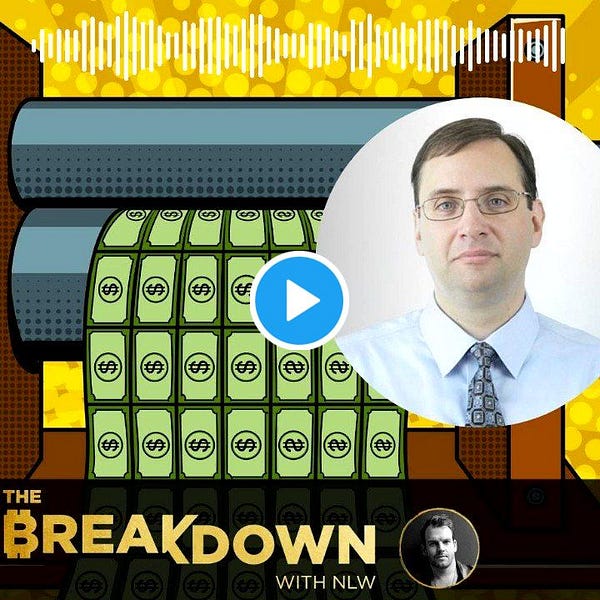Long Reads Sunday #97
Happy Sunday from the Hudson Valley
The last two weeks have been some of the most significant in recent American political history. At the moment, they seem far from resolved. I don’t get too deep into the underlying causes (with the exception of sharing a few threads and insights I thought particularly relevant) but instead focus on the markets happening around (and in some ways oblivious too) the social unrest.
But first, the news and podcasts from the week.
This Week’s Top Bitcoin & Crypto News
A positive sign - over 60% of BTC hasn’t moved in over a year. The last time this happened was just before the 2017 run-up
Chase Bank to refund extra fees it charged crypto buyers in 2018 - not a good look guys
According to The Block, the number of blockchain investment deals has declines for seven straight months
Crypto journalism startup Civil has shut down
Bitcoin mining pool Poolin has partnered with BlockFi to increase crypto lending
The USA has put a $5m bounty on the head of Venezuela’s digital currency lead
Hester Peirce (aka CryptoMom) has been nominated for a second SEC term
A new Bitcoin Core release comes with software designed to protect against nation-state level attacks
Bloomberg puts out an extremely bullish bitcoin research report calling for $20k BTC this year
The USA’s body for regulating banks is asking for input on cryptocurrencies
Robinhood users have growing interest in blockchain ETFs
Europol, the European Union’s law enforcement agency, is looking warily at privacy-preserving crypto wallets
Bitfinex has spun out a new privacy-focused DEX that is attracting the attention of institutional investors
Two more bits of crypto intrigue that need a little bit more room.
First has to do with a dustup around the Brave browser. Over the weekend, someone noticed that typing in Binance was automatically adding a referral code.

Brendan Eich quickly came to Twitter to say that the issue had been resolved.

If anything, it is a reminder that companies who are offering an alternative to the crap practices of today’s market leaders have to balance the need to make the business model work with the near requirement of being absolutely beyond reproach when it comes to user trust.
Which brings us to our second situation. A year ago, Coinbase raised the hackles of…well, everyone…when it acquired a company that included members of the infamous Hacking Team. On Friday, The Block broke the news that Coinbase was in conversations with the IRS and the DEA about selling blockchain analytics.
Matt Odell summed up basically the entire crypto community’s sentiments:
To make matters worse, this came just after bad customer service led Nassim Nicholas Taleb to rage quite the exchange.
This week on The Breakdown podcast
Monday | The Power and Peril of the 'Bitcoin Fixes This' Meme
A look at what role, if any, bitcoin has to play in remaking the world that is being protested around the U.S. (and world) this week.
Tuesday | Bitcoin, Cellphones and the Citizen Tools of Anti-Authoritarianism, Feat. Alex Gladstein
A look at the anti-authoritarian technology stack, including where non-state money like bitcoin fits in.
Wednesday | 5 Numbers That Tell the Story of Markets Right Now
From the number of U.S. flights from Chinese carriers to S&P 500 growth in the tumultuous year of 1968, these (unexpected) numbers tell the story of today’s markets.
Thursday | The Mirage of the Money Printer: Why the Fed Is More PR Than Policy, Feat. Jeffrey P. Snider
An argument that the Fed is actually highly ineffectual due to the presence of the eurodollar shadow-banking system.
Friday | The Biggest Realignment in the US-China Relationship Since Nixon, Feat. Graham Webster
A 101-level primer on the history of the U.S.-China relationship, and why today’s bluster represents a fundamental shift.




Our Main Theme: Markets In A Time Of Madness
As I mentioned above, there is so much to be said about the underlying causes of these protests that I’m not going to try to get too deep into it here. That said, what’s clear is that while the spark that lit the fuse was the brutal murder of George Floyd, the anger, frustration and fear that have poured forth are about much, much more.








Given the economic roots of (at least part) of this unrest, it becomes interesting to ask how the markets are reacting to it, if at all?
The short answer is: they’re not.
In fact, since March 23rd, we’ve seen the largest 50-day rally in S&P500 history.


Of course, not everyone is convinced of the strength of the rally.

Turns out, this isn’t a historical anomaly. In 1968, for example, markets ended up 7.6% on the year - despite the assassinations of MLK and RFK; the Tet offensive; and more.







Another interesting dimension to this rally is the role of retail. The Davey Day Trade effect is on full display, as traders conditioned on buying against the Fed action rather than value pile in to stocks like the airlines.



Add on top of this Jobs reports numbers that stunned basically everyone and which no one has compellingly explained, and you have a strange strange moment.


For those of us in cryptoworld, Avichal might have said it best.
Catch you next week - NLW







